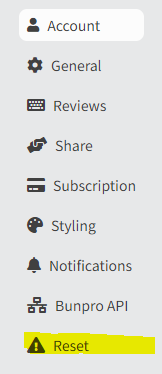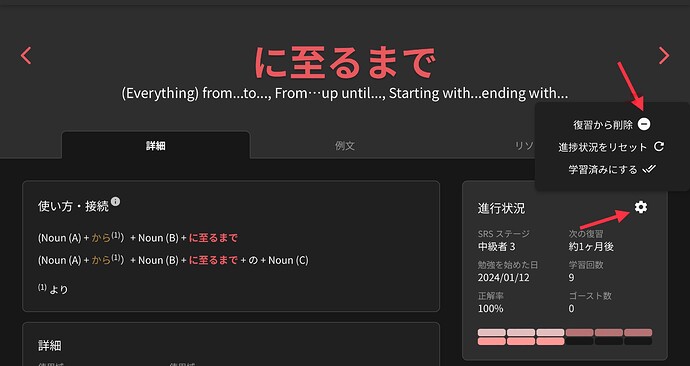It feels like it’s just too hard to do this stuff. The sentences are too long with too many words that I simply don’t know. Is there a way to get it to give me smaller, more beginner friendly sentences? It also seems like it’s not very structured. It would be cool if the sentences built off of each other such that new grammar points are not added to the sentences until you learn the others that depend on them.
It sounds like it would help you to study more vocabulary alongside grammar. Bunpro offers vocabulary decks you can go through as well. You can also use a browser extension like Yomitan to look up words. I still don’t know every word in the example sentences and have to look them up all the time.
If you’re following the Bunpro grammar path then they will build off of each other. (at least I’m pretty sure) If you’re following one of the other paths then it can get very confusing unfortunately. I had started with the Genki path and then just restarted with the Bunpro path because it wasn’t working out for me. 
It is too hard. That’s why I quit three times. It’s also the easiest way to learn Japanese. Paradox
As was suggested, take advantage of the vocabulary decks. Maybe take it a little bit slower with the grammar deck, and when you encounter unknown words, add them to your reviews.
I think it’s fine if you don’t understand a couple of words in a sentence, but not if you barely understand anything and are just answering questions based on hints, that’s not acceptable to me. Perhaps I’m more strict about that than others when it comes to that though.
That said, if you’re starting BunPro from zero, then it’s gonna be inevitable that you’re not gonna understand much of anything. In that case, maybe focus on vocabulary first and, once you finish the N5 deck (or at least learn the most common words), then give the grammar deck another try.
HTH!
Is there a way to delete and reset everything? I wanna remove cards from my learning
I don’t know if you can do a whole deck at the same time, but you can certainly go into each grammar point you want to remove, click on the little wrench icon, and then the icon with the minus sign. That will completely reset it (as shown below):
Click on your name and go to settings. It’s the last option on the bottom left.

You may benefit from going through a core 2000 vocab deck. There are a few available for free on Anki’s shared decks They contain short, simple sentences taken from iKnow. You can also get iKnow, but it’s pricey.
Well to be blunt, Japanese is hard. Like really, really hard.
Bunpro is structured the way it is so that you are constantly being introduced to new subject matter. It’s effective. It also teaches you to deal with ambiguity. Which is probably the most important, least talked about skill when learning this language (maybe any language. Idk I’m not a linguist).
It’s difficult and really frustrating at first (which for me was 2 1/2 of tenacious study). Basically, you’ve just gotta keep pushing and exposing yourself to Japanese.
As others have said, start adding in some additional study material to supplement bunpro if you think it will help. But that’s going to add another layer of complexity to your studies, so be prepared for that as well!
If you’re just starting out on Grammar, I would highly recommend starting with a dedicated grammar book (in particular, there are many books specifically supported by Bunpro; check the Decks section to see which ones), and follow that first off, using Bunpro as an additional tool to help you study from the book. If you use the Deck for a specific book, Bunpro will present the lessons in the order they appear in the book. (Also, for several books the corresponding Bunpro deck will cover both Grammar and Vocab presented in the book; there may be more than one Deck to choose from; choose the one that has both types.)
This is how I started out with grammar. I did Genki I, using Bunpro on the side to help me practice and remember all the lessons from Genki I. I then started Genki II. I can’t remember if I finished it or not. I think I did, but I’m not 100% sure.
But basically, after I ‘got off the ground’ so to speak, I started using Bunpro as my ‘wings’ to fly higher and faster. I’ve ended up going through all the Decks from all the Beginner level grammar books, and the majority of the Intermediate level books. Not going through the books, actually, just going through the Decks for the books.
At a certain point, I switched to the JLPT grammar decks, starting by catching up with all/any grammar points I had missed from N5 (most had already been covered by the beginner Decks). Then N4, and now I’m more than half-way through N3.
At a certain point, you’ll be able to go steadily at your own pace. But starting out can be daunting. That’s why I suggest getting a dedicated beginner-level grammar book and using that as your initial guide.
The asian languages are pretty famous for being very hard to learn for people who come from western languages. It isn’t that bunpro is really hard, it’s just that the task itself is hard. Well at first, but once you start having enough in your head to start connecting the dots its only mildly difficult.
And if the sentences built off of each other you would just be relying on your knowledge of a previous grammar point. Not connecting them forces you to learn.
Don’t worry though, exposure and time alone will get you most of the way. And don’t worry about getting things wrong, you’re never going to be a native speaker so don’t hold yourself to their standards.
The sentences from the N5 lessons are extremely easy (even as another beginner)… As others suggested, I think you need to work on building your vocabulary first. That being said, if you review the sentences enough times (searching up the words you don’t know), you will learn those words regardless. Good luck homie.
Different things will work for different people. I personally attribute pretty much all of my grammar knowledge to Bunpro. I started Genki, read maybe one chapter and decided that I didn’t want to be spoonfed polite forms of everything before I even knew how the words worked.
I also struggled with the vocab a lot on Bunpro to begin with, but the point of Bunpro back then, and still now, is grammar first. To test whether Bunpro is actually working for you, focus 100% on the grammar, then swap the irrelevant words in the sentence with words that you actually know.
For example, let’s say the grammar point that you want to learn is つもり ‘to plan or intend to do’
明後日、仕事を辞めるつもりです。
‘I plan to quit work the day after tomorrow’.
Something を something つもりです. This is all that matters. If you don’t know the words 明後日 or 辞める, replace them with ones you do know in your head.
今日、ピザを食べるつもりです。
‘I plan to eat pizza today’.
If the sentence suddenly makes sensse, it means you do actually understand the grammar, and it is just a vocab problem. Maybe try this process out, and if you think the issue is vocab, the Bunpro vocab decks with their many short example sentences will probably be really helpful! 
I like this a lot, I should do this more. I tell my students to do this in English, but never thought to do it in Japanese.
With difficult things in life and especially with one of the most complicated languages, there aren’t going to be any easy routes. Personally I find the structure to be quite straightforward and simple, but that’s because I already know most of the vocabulary. There is no way for you to progress without learning new words, and they cannot just teach people all of the grammar without introducing a variety of vocabulary as that would be very inefficient and tedious as people get better.
I agree with this. personally I hardly read the sentence at all. just look out for the grammar point using the basic english or japanese hint on cloze. while yah, my vocabulary is quite far behind my grammar, I’m able to read and understand most of the grammar that pops up.
First of all, it’s not necessary to understand every word of every sentence. That said, having a larger vocabulary is helpful since you will feel less disoriented. I personally had significant vocabulary and some very, very basic grammar before I started here. I’d recommend getting your vocabulary going and using materials from other sources to enhance your learning.
I also mostly ignore the exact meaning of the sentence I’m reading and just go for applying the grammar correctly, at least if there’s multiple words I don’t immediately know. I think this is a good way to go, study and focus on grammar for grammar points, and worry about vocab when you’re studying vocab or immersing.
I think i did four resets of Bunpro. I’ve finally reached a point where i no longer feel its necessary, but it took a while lol. What helped me a lot was just doing Genki (and the Tokini Andy videos on Youtube). Im also slow, after two years im working towards the end of N4, because i dont have a lot of free time. But i am consistent, i havent missed a day of doing at least something.
So just keep up! Japanese is hard, but if you keep working, learn more words, then things will start to make more sense.
If you’re following the Bunpro grammar path then they will build off of each other. (at least I’m pretty sure)
I would only mostly agree. I found quite a few sentences that skipped ahead with their grammar and didn’t consider the Lesson path for N5. Thankfully this is the exception.
I gave feedback on many things - missing audio, missing ichidan/godan markers, inconsistencies in what is being asked for, in the hints, and yes, inconsistencies in sticking to their own lesson path.
I’d say the majority of my feedback was ignored, though some they will eventually work through. Lots of feedback items without reply or resolution. Beyond that, a few of the replies (not many) were unhelpful. Not nice if I’m doing the bug hunting for them! 

